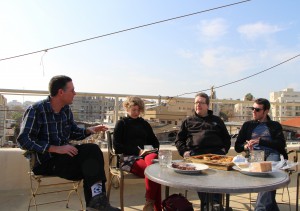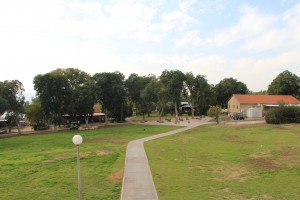Shabat, 4th of January 2014, 10am, Tel Aviv-Jafo
Dr. Chen Yehezkely, http://chenyehezkely.blogspot.de/
Chen, who holds a PhD in Philosophy and earns his living as a driver, began his talk with the self-confident statement that „You surely have a lot of questions and I will answer all of them“. He then explained his confidence as resulting from considering “I don’t know” as an answer, and from not guaranteeing the truth of any of his other answers. „Nobody understands Israel“, he said, “least of all Israelis themselves. We just believe we understand because we are used to it. This is confusing habit with understanding.”
Chen emphasized that his view of the kibbuz is critical, coming from deep sympathy and appreciation. “I do not bother criticizing”, he said, “those whom I do not appreciate”. He referred to his own internalization of Kibbuz education by hinting to his book „Closed education in an Open Society“. Asked about the history and present of Kibbuzim in Israel he reminded us that the first Kvutza (an earlier term for Kibbuz) was founded in 1910 while the first Kibbuz was set up in 1921 and ever since evolved through a process of constant adaption and change.

He described the early idea of „Sharing everything with everybody“ including personal relationships, as utopian. At the same time he claimed that it contradicted a second crucial ethos of the Kibbuz, the development of the New Jewish Individual. In the utopian ideology of the kibbutz, he said – as, perhaps, in all such – contradictions are smoothed over.
Sharing Everything
In the early Kibbuz, any notion and need for private property was critically eyed since it was seen as a slippery slope to the loss of egalitarian social structures. He told us that there are two general takes on the new Kibbuzim that evolved after an existential crisis in the last three decades. One is that the Kibbuz has done its job and can righteously wither. The second is that the Kibbuzim nowadays can make valuable contributions to the existential crisis that Israel faces.
Historically, Kibbuzim played a gigantic role in the set-up of the state of Israel. They settled where nobody else settled and therewith set the borders of the state-to-come, especially in the 1930ies by setting up their places literally overnight which deemed them initially illegal but eventually legal under law of the British authorities. An idea that is now perverted by messianic settlers in the West Bank who refer to religious texts of Joshua to legitimize occupation and even the wiping out of the „other peoples“ of Israel/Palestine. While the early Kibbuzniks did not recognize British, rule the messianic settlers de-facto don’t recognize the state of Israel of today.
Another factual evidence of their importance was that while Kibbuzniks never amounted to more than 4% of the population (currently around 2,5 %) they had to mourn for 12-30 % of the casualties in the different Israeli wars. Kibbuzniks were often in the frontlines or pilots and hence suffered most for the country.
The Kibbuzim according to Chen mainly thrived due to heavy support by the Jewish Agency and later the state of Israel. Being based both economically and ideologically from their beginning on land and agriculture, agricultural revenue only plays a small part in today’s Kibbuzim. While not being economically viable themselves, the cuts in funding around 1971 lead to the fundamental crisis of Kibbuzim mentioned before.
The ever-existing question that was posed the stronger after this is: How can the Kibbuz as a socialist island exist in a capitalist world? Three strategies were adopted historically. The first stance was that it couldn’t survive in the capitalist surrounding and hence force needed to be directed to global revolution. In this thinking the Kibbuz prepared ground for the conquer of Israel by the Soviet Union. Hence, this stance was often connected to the following of Lenin and Stalin till the 1950s when the atrocities committed by the regime against Jews were revealed and led to heavy internal discussions. Another answer was to say the Kibbuzim need to be big and strong in order to be resilient while the third was to say we will be socialist internally and capitalist towards the outside world. Some combination of the latter was adopted by most Kibbuzim with all its difficulties and contradictions.
For instance people dealing with the commerce to the outside were both honored for getting their hands dirty and at the same time despised for dealing with evil money. Overall, Chen claimed this is an example of the extreme ambivalence of the Kibbuz movement towards a lot of different things, including the very core of its own ideology.
The „New Jewish Individual“
Following on from the question if only Jews were allowed to join, there arose an elaboration of what constituted the „New Jewish Individual“. While in the past Jews were often forced to work with money in one way or the other, the Kibbuzniks wanted to defy this association often used as anti-semitic stereotype. They wouldn’t follow the commandments, reject their passive role as observant believers and be pioneers. But what then constituted being Jewish if not religion and the Torah? And how does one become a non-religious Jew when wanting to join a Kibbuz for instance?
These questions were always in the air, yet nobody actually dared to ask them until a few years ago, which basically meant that if one wanted to join a Kibbuz he/she had to undergo an Orthodox conversion. The Kibbuzniks know that this is an ideological contradiction and the Rabbis know that the converted will not become religious practitioners in the Orthodox sense. Everybody pretends.
But beyond conversion what does it mean to be a „New Jew“. Chen couldn’t really answer this question beyond it being embracing Judaism but not confining oneself by it. It meant being aware of the Jewish history, and of course after the Holocaust a new unifying narrative came upon all of the Jews, not of their own choice. Chen nagged us by „not saying“ that this narrative is now used to oppress the Palestinian people. Similarly provocatively he said that the Holocaust survivors were creating just another Jewish Ghetto with their Kibbuzim. On the whole, he summed, the treatment of the Holocaust in Israel is shameful.
He illustrated this question in the Kibbuzim by the story of a Dutch Kibbuz worker who has been „a Kibbuz mother’s dream of a son“ in many respects and was fully assimilated and also fell in love in the Kibbuz but was finally rejected membership because he did not want to convert.
Also, to repeat, the Kibbuzim held contradictory values. They wanted to be Jewish and zionist and at the same time socialist and cosmopolitan, holding universal values. More abstractly this was a conflict of particularism and universalism within the Kibbuzim’s beliefs. One attempt to come to terms with this was for instance the adjustment of religious Pesach texts and calendars to the Kibbuz ideology. Nevertheless Chen claimed that the Kibbuzim pretended to be more reformed than many actually where, which again connects to the rejection of the Dutch volunteer. Only orthodoxically converted Jews could enter most if not all Kibbuzim. On the other hand the assimilation of Mizrahim into Kibbuzim was happening. Yet they had to face the same challenges in all Israel at the time. Even though Jews from Alexandria or Baghdad for instance would be far more cosmopolitan than their European and Russian counterparts, they were still looked down upon. This also opens up a more general question on how adapted the practice of European communists and socialists in the Kibbuzim was to fit into the environment of the Middle-East in which they had to exist.
Today’s Role of Kibbuzim in Israeli Society
So what could Kibbuzim contribute to today’s Israel? They could for instance say something about the most burning issues which include peace and the multiple failures of peace negotiations, the separation between Church (i.e., religious authority) and state, which remains a challenge (and is mis-presented in Israel as the separation between religion and state), and the fight against poverty as a most pressing issue in contemporary Israeli society. While the average Israeli would feel satisfied on these issues in comparison to the surrounding states, the Kibbuzim could push this agenda forward. However, many of them are still in survival mode and mostly speechless. Many are in the process or have already finished privatization, after which something like a micro-scale social democratic regime is established while a smaller portion still practices the radical model of the past and adjusts it to modern necessities.




Links and References
Chen Yehezkely: Closed education in an Open Society. Kibbutz Education as a Case Study, 2012
Andreas Exner: Commons-Archipel: Die historische Kibbutz-Bewegung
